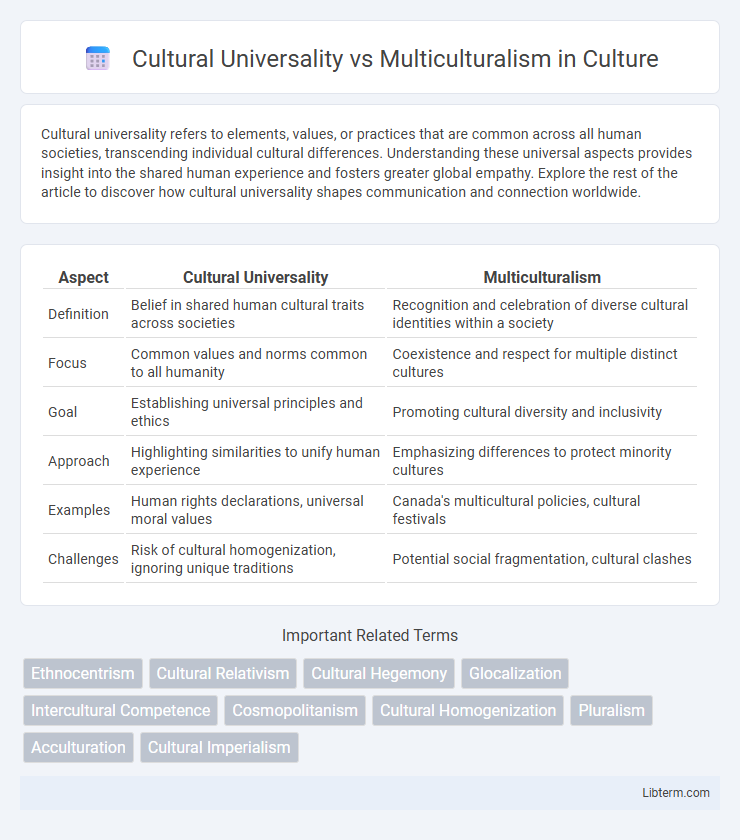Cultural universality refers to elements, values, or practices that are common across all human societies, transcending individual cultural differences. Understanding these universal aspects provides insight into the shared human experience and fosters greater global empathy. Explore the rest of the article to discover how cultural universality shapes communication and connection worldwide.
Table of Comparison
| Aspect | Cultural Universality | Multiculturalism |
|---|---|---|
| Definition | Belief in shared human cultural traits across societies | Recognition and celebration of diverse cultural identities within a society |
| Focus | Common values and norms common to all humanity | Coexistence and respect for multiple distinct cultures |
| Goal | Establishing universal principles and ethics | Promoting cultural diversity and inclusivity |
| Approach | Highlighting similarities to unify human experience | Emphasizing differences to protect minority cultures |
| Examples | Human rights declarations, universal moral values | Canada's multicultural policies, cultural festivals |
| Challenges | Risk of cultural homogenization, ignoring unique traditions | Potential social fragmentation, cultural clashes |
Understanding Cultural Universality: Core Concepts
Cultural universality refers to the shared elements and values that exist across all human societies, such as language, family structures, and moral codes, which provide a foundation for common human experiences. Core concepts include universal human rights, basic social norms, and fundamental psychological needs that transcend cultural differences. Recognizing these universal aspects fosters mutual respect and facilitates cross-cultural communication within diverse, multicultural environments.
Defining Multiculturalism in Today’s Societies
Multiculturalism in today's societies emphasizes the coexistence and mutual respect of diverse cultural groups within a shared social framework, promoting inclusion and cultural pluralism. It challenges the notion of cultural universality by recognizing the value of unique cultural identities and advocating for policies that protect minority rights and cultural heritage. This approach fosters social cohesion by encouraging intercultural dialogue, equity, and the celebration of diversity as a dynamic component of modern communities.
Historical Perspectives on Universalism and Diversity
Historical perspectives on universalism emphasize shared human values and common ethical principles transcending cultural boundaries, rooted in Enlightenment ideals and global human rights frameworks. In contrast, multiculturalism arose as a response to colonial histories and postcolonial critiques, advocating for the recognition and preservation of cultural diversity within societies. Debates continue around balancing universal norms with respect for cultural specificity to address challenges in global governance and social cohesion.
Key Benefits of Cultural Universality
Cultural universality promotes shared values and ethical standards across diverse societies, facilitating global cooperation and mutual understanding. It enhances communication by establishing common cultural references, reducing misunderstandings in international relations and business. Unified cultural frameworks support inclusivity and equal rights, fostering social cohesion in multicultural environments.
Advantages of Embracing Multiculturalism
Embracing multiculturalism fosters social cohesion by promoting respect and understanding among diverse cultural groups, which enhances creativity and innovation within communities. It encourages inclusive policies that protect minority rights and create equitable opportunities, leading to economic growth and global competitiveness. Multicultural societies benefit from enriched cultural experiences and expanded worldviews that strengthen diplomatic relations and cross-cultural collaborations.
Common Ground: Where Universality Meets Diversity
Cultural universality emphasizes shared human values such as respect, empathy, and justice that transcend individual societies and provide a foundation for global cooperation. Multiculturalism celebrates diverse traditions, languages, and customs, enriching social fabrics by promoting inclusion and mutual understanding. The common ground between universality and diversity lies in recognizing universal human rights while honoring cultural differences, enabling harmonious coexistence and collective progress.
Major Challenges to Cultural Universality
Major challenges to cultural universality include the inherent diversity of cultural identities, which resists homogenization and highlights different values, beliefs, and practices across societies. Ethical dilemmas arise when universal norms fail to respect local traditions, leading to potential cultural imperialism and loss of indigenous knowledge. Furthermore, globalization intensifies tensions between preserving cultural uniqueness and promoting shared human rights, complicating efforts to establish universally accepted principles.
Barriers Faced in Multicultural Societies
Barriers faced in multicultural societies include language differences, which hinder effective communication and social integration. Cultural misunderstandings and stereotyping contribute to social fragmentation and bias, limiting opportunities for collaboration. Institutional challenges arise from differing cultural norms and values, affecting policies on education, employment, and social services.
Case Studies: Global Examples of Culture Integration
Case studies of cultural universality versus multiculturalism reveal diverse methods of culture integration across the globe. Singapore exemplifies cultural universality through its national identity emphasizing common values despite ethnic diversity, while Canada promotes multiculturalism by actively supporting cultural distinctiveness and inclusion policies. These approaches highlight contrasting but effective strategies for managing cultural diversity in global societies.
Future Outlook: Balancing Universality and Multiculturalism
The future outlook on cultural universality versus multiculturalism demands a nuanced approach that values shared human principles while honoring diverse cultural identities. Integrating universal human rights frameworks with policies promoting cultural pluralism ensures social cohesion and innovation in global communities. Embracing this balance supports sustainable development and inclusive governance in an increasingly interconnected world.
Cultural Universality Infographic

 libterm.com
libterm.com